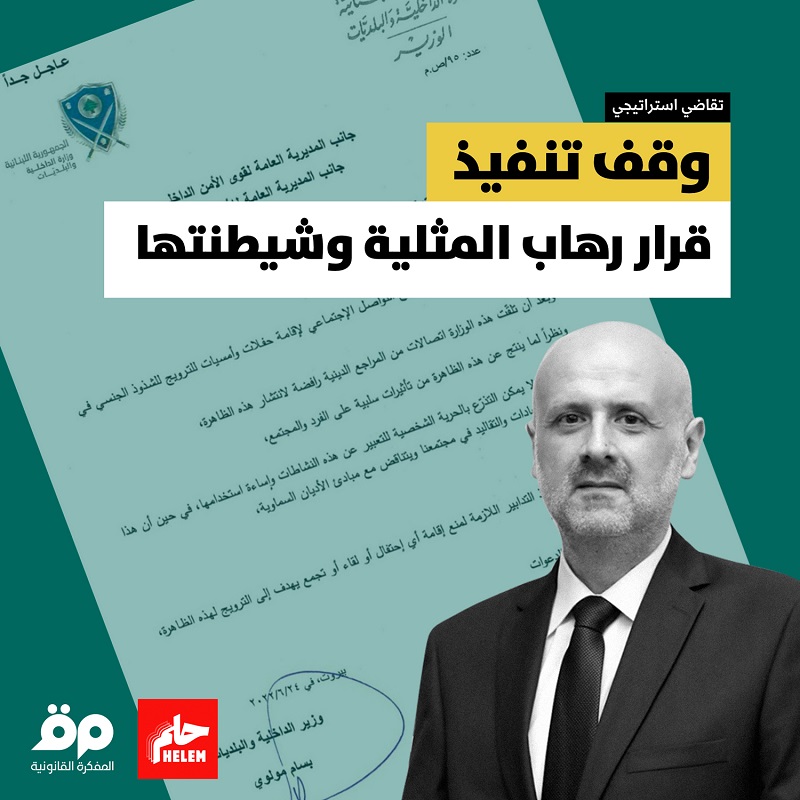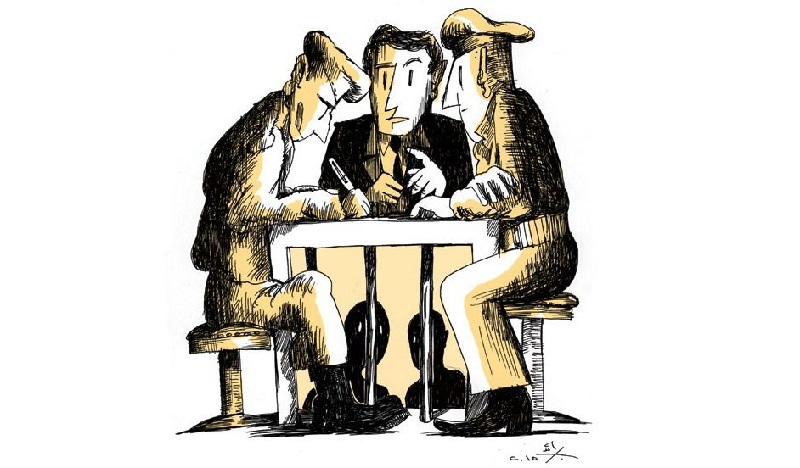State and Civil Society in Egypt: Discourse vs Reality

Amid the launch of Egypt’s National Human Rights Strategy, which repeatedly stresses the importance of partnership between the state and civil society, President Abdel Fattah el-Sisi has declared 2022 the “Year of Civil Society”. This discourse clashes with facts on the ground. Rights organizations are being increasingly constrained through the 2019 law regulating institutions and civil society (the “NGO law” ) while human rights workers continue to be p rosecuted, as detailed in several reports.
The subject of civil society in Egypt occupies a central place in political and academic analyses. Before the 25 January 2011 revolution, the key question was civil society’s relationship with democracy and whether supporting development and – in particular – rights-oriented civil society organizations would drive democratic change in Egypt.[1] Since 2013, most analyses of Egyptian civil society have focused on the restriction of the right to organize and receive funding. This article examines civil society in Egypt today from a new angle: Given the clampdown on rights organizations, who or what is the civil society that the president and the strategy are talking about? What civil society does the state envisage in Egypt today?
Researchers distinguish between development, rights-oriented, and charitable civil society organizations.[2] They say that rights organizations are the most susceptible to harassment, though its severity and tools differ from one period to another.
This article retains this di stinction and does not document the clampdown on rights work. Instead, it raises three points about the state and civil society in Egypt today. Firstly, we are observing a new phenomenon whereby the state occasionally acts as though it is civil society. In other words, it uses tools, discourses, and concepts particular to civil society (a mixture of developmental and charitable) to implement its vision. Secondly, the state deems the private sector a key actor in civil society through the concepts of corporate social responsibility and social entrepreneurship. Consequently, it considers this sector an essential development partner. Thirdly, with the continual clampdown on rights institutions and the co-optation of development work, civil society remains restricted to the concept of community-based work [al-‘amal al-ahliy – charity work that relies on existing community ties ] conducted in partnership with the state and under its oversight and auspices. No opportunity is being afforded for the organic development of other forms of collective action capable of achieving active citizenship and creating political institutions that express differences and contentions in the public sphere.
Policies or Initiatives: Why Does the State Adopt Civil Society Language?
Recent years have undoubtedly witnessed comprehensive and extensive policy programs that directly affected daily life. They include economic reform, urban planning, and infrastructure programs, education reform programs, and social protection and family development programs. However, there is a noticeable tendency to frame state action and programs in the language of civil society, whether developmental or charitable. The best example is the presentation of certain policies as presidential or ministerial “initiatives”. The issue here transcends labels : this behavior constitutes a new mechanism that we must deconstruct in order to comprehend its political and implementary role.
These mechanisms include efforts to link many of these initiatives to the president and portray them as a response to community demands or youth ideas. They are also distinguished by their reliance on the idea of volunteering, solicitation of donations from citizens, and focus on the community’s role and individual impact (whereas policy programs principally involve governmental agencies and institutions). These features can be seen in one of the largest initiatives, namely Haya Karima [Decent Life], which focuses on poverty as a humanitarian problem, not just a socioeconomic one. This is in contrast to other state-offered social protection programs that adopt the language of international institutions and neoliberal economic policies. Such programs include the Takaful and Karama [Solidarity and Dignity], Forsa [Opportunity], and Mastoura [Ends are met] programs.
Haya Karima’s Arabic website introduces it as, “ the national initiative launched by H.E. President Abdel Fattah el-Sisi, president of the Arab Republic of Egypt, on January 2nd. It is a multi-pillar, integrated initiative that stems first and foremost from civilizational responsibility and humanitarianism. Beyond improving the living conditions and daily life of Egyptian citizens, the initiative also aims to conduct immediate intervention to protect Egyptians’ dignity and right to a decent life”.
Development and charity discourse intermesh in Haya Karima. From one angle, the initiative is referred to as the “Haya Karima Foundation”, with a focus on volunteer action. The concept of volunteering also appears in the aforementioned introduction :
“The Haya Karima Foundation was established on 22 October 2019 by youth volunteers who present a unique role model for volunteer work… The foundation aims to conduct humanitarian intervention to develop Egyptians and protect their dignity and right to a decent life to instigate palpable change to consolidate all charity and development work efforts ”.
From another angle, the discourse of donations is used in a manner very reminiscent of charity work. The website includes a “Donate Now” link, which is paired with the message:
“Every pound will make a difference to the lives of 58 million citizens. From where you are, you can help change the lives of over half Egypt’s population so we can provide them with a decent life”.
Language and tools historically associated with charity work, such as medical caravans and direct aid, are also used. There is a focus on direct intervention with “real” and palpable effects on the “livelihood” level. Poverty appears – at least in the discourse about the initiative’s activities – via stories of “struggle” and individual suffering in which the volunteers intervene to realize people’s “dreams” by building a home, providing a job, or discovering talent.[3]
Yet this language is intermeshed with the language of policy. Haya Karima is not merely a presidential initiative to combat poverty; it is also a “national project to advance country villages” in which broader levels of action are introduced via terms like “advancement” and “development”.
This discursive intermeshing in the levels and mechanisms of action is mirrored by other actors, such as political parties. For example, Mostaqbal Watan [Nation’s Future Party], which currently has a majority in Parliament, relied heavily on this type of initiative to establish its presence in the street. It conducted direct intervention initiatives to solve crises or provide aid. The levels of party action also intermesh with the presidential initiatives, as the party’s leaders have declared that they are working “under the umbrella” of Haya Karima.
The initiatives could be a mechanism to achieve partnership among the state, civil society, and political actors. The intermeshed discourse may reflect the plurality of actors. State-civil society partnership is, after all, a key component of a program like Haya Karima. The introduction refers to “a framework of integration and concerted efforts among the national state institutions, private sector institutions, civil society, and development partners in Egypt” and states that the initiative unites “more than 20 ministries and agencies and 23 civil society organizations”. However, the latitude left for these organizations and the limits of their role remain unclear. Some studies indicate that the role of civil society institutions is limited to implementation and does not extend to planning or determining priorities.[4]
The nature of the initiative mechanism – particularly its legal and political status – is also marred by ambiguity. Unlike policies or programs conducted in partnership with international institutions or government agencies, the initiatives are not subject to any degree of oversight. Nor are they subject to community work regulations . The sources of funding are also very opaque: the initiatives are neither incorporated into the state budget nor funded by international loans. Likewise, the legal and financial status of citizens’ donations is unclear.
Thus, the state’s call for partnership with civil society should not distract from the presence of much co-optation, not only of civil society ’s capacities, data, and operating space, but also its tools and discourses. However, before discussing the effects of this co-optation on civil society’s fate, we will examine the role of the private sector in development and charity work and how the state – through the growth of the concepts of corporate social responsibility (CSR) and social entrepreneurship – considers it a key part of civil society.
The Private Sector: A Key Partner of the State
A 2014 American University in Cairo study says that the concept of CSR emerged in Egypt in the late 1990s and early 2000s as multinational companies became more present in the country.[5] CSR has several dimensions, but what concerns us is the idea of the private sector performing a role in service of society. In other words, companies must help to develop society and solve public problems via various means. According to the study, the concept of CSR was for a long time understood only as religious charity , with a focus on the positive effect on the company’s image and brand and without intercompany coordination, a clear vision, or partnership with community-based and development organizations.
However, the CSR situation changed a lot with the launch of economic reform programs, the establishment of the Tahya Misr [Long Live Egypt] Fund, the renewal of partnerships with international economic organizations, and the adoption of new government policies. We propose that there is a trend – at least on the discourse level – toward interpreting CSR as participation in the state’s development plan under the sustainable development slogan, which appears in the Egypt 2030 Vision.
In 2015, the first periodic Egypt CSR Forum was launched. The forum’s is aimed at raising awareness of CSR, coordination, and information sharing. It introduces the forum as “the first integrated portal for social responsibility and sustainable development in Egypt, the Middle East, and Africa. We work to assimilate the goals of sustainable development into our society to improve quality of life”.
From one angle, the forum’s website clearly adopts the discourse of sustainable development. From another angle, it seeks to highlight parallelism and integration between companies and government policy. The news section contains news about the Ministry of International Cooperation, the Ministry of Planning, the state’s development projects, and international cooperation agreements. Key terms adopted by the ministries – such as “green economy” and “sustainable development” – are reproduced. The website also includes a platform for registering charity or development activities by companies or civil society organizations for the purpose of creating a map that shows community-based and development activity by geographic location.
However, the change in approach to CSR appears to still be limited to discourse. A Masr 360 report shows that the focus so far is on the charity aspect of social responsibility and that, despite the addition of new goals, insufficient light is being shed on the actual steps taken, if they exist.
From another angle, there is a new concept that links the private sector to civil action and adopts the developmental approach more clearly, namely social entrepreneurship or social impact businesses . Many studies and analyses have addressed this subject, especially as it received much attention after the January 2011 revolution.[6] The concept basically refers to the mixing of social objectives and profit objectives or to the application of methods of managing businesses, especially small and new ones , to social work. The term “social impact business” could be applied, for example, to a business that seeks to solve a social problem and profits from the solution or to a nonprofit organization managed like a business. Given the state’s interest in youth entrepreneurship and the spread of the concept of “startup incubators”, social impact businesses receive attention and encouragement, especially from the international community, and attempts are being made to build bridges between them and large companies. For example, the StartEgypt initiative coordinates among social impact businesses, provides support, and hosts forums and competitions supported by the World Bank, the British embassy, and Flat6Labs.
The truth is that the state is focused less on entrepreneurship’s social impact than on its economic impact, even if it has occasionally presented youth who formed “successful” social impact businesses or initiatives in its youth conferences as an example of positive ways to serve the nation.
Thus, the state seems to see the private sector – whether it adopts a discourse of development, charity, or entrepreneurship – as a key civil society actor. Hence, the question remains, how does the state see this civil society, and what are the foundations of the state’s relationship with it?
Community-based [Ahliyy] Society or Civil Society?
An article on the issues of Egyptian civil society in the periodical published by the Cabinet’s Information and Decision Support Center exemplifies some of the problems in the state-civil society relationship. The author mentions the increase in the number of development and community-based associations. He, nonetheless, criticizes the domination of community-based work over civil society and the reduction of civil society to this concept, while excluding “the other components of civil society, such as cooperatives, trade and labor unions, and other nonprofit and nongovernmental organizations and institutions”. The author attributes this issue to the “absence of strategic planning”, the “absence of a database defining contributions”, and “Egyptian civil society’s haphazard role, unfinished construction, and failure to take root”. The article echoes the Egyptian state’s discourse that civil society is weak and incapable of organizing. The National Human Rights Strategy repeats phrases like “the weak human rights culture” and “the weak culture of volunteer work and community participation ”.
Here lies the problem in the way that civil society in Egypt is understood today. The state and its intellectuals and supporters believe that civil society is weak and unable to organize, and that organizations are out of touch with citizens’ real needs.
In reality , the reason that civil society is limited to community-based work is the harassment and constant surveillance it faces and the continuation of a security-based approach to rights and development organizations.
Moreover, during the past decades in Egypt, the development sector of civil society – particularly its community-based component – has played the main role in social protection and assumed the responsibilities that the state has gradually abandoned. One key anthropological study on the state and society in Egypt mentions the “privatization of social protection”, i.e. the shift of responsibility from the state to individuals and community groups.[7] Despite all the obstacles, community-based and development organizations have managed to establish a presence on the ground, form safety nets, and collect data. Consequently, they were able to spread and build experience in collective action, albeit without sufficient organization or coordination.
In conclusion, partnership between the state and civil society could benefit both parties. However, the persistence of a security-based perspective on rights and development organizations, as well as the government desire to co-opt and control all kinds of social spaces , will prevent civil society from growing organically and forming the collective civil movement needed to turn it from a community-based society into a true civil society – if community-based work continues .
This article is an edited translation from Arabic.
[1] Michel Camau, “Sociétés civiles ‘réelles’ et téléologie de la démocratisation”, Revue Internationale de Politique Comparée, vol. 9, no. 2, 2002, p. 213-232.
[2] Catherine E. Herrold, “NGO Policy in Pre- and Post-Mubarak Egypt: Effects on NGOs’ Roles in Democracy Promotion”, Nonprofit Policy Forum, vol. 7, no. 2, 2014 , p. 189-212.
[3] See the media available on Haya Karima’s Facebook page.
[4] Ayman al-Sayyid Abd al-Wahhab, “Nahwa Mujtama’ Madaniyy Jadid”, Afaq Istratijiyya, June 2021.
[5] Sara Refaat, “Corporate Social Responsibility in Egypt: A Study on the Current Practices, Challenges and Potentials”, Master’s thesis, American University in Cairo, 2014.
[6] For example, Yomna Elsayed, “At the Intersection of Social Entrepreneurship and Social Movements: The Case of Egypt and the Arab Spring,” VOLUNTAS: International Journal of Voluntary and Nonprofit Organizations, vol. 29, no. 4, 2018, p. 819-831.
[7] Salwa Ismail, Political Life in Cairo’s New Quarters: Encountering the Everyday State, University of Minnesota Press, 2006.



